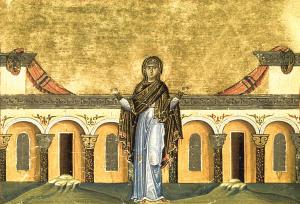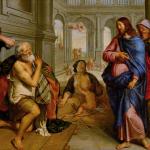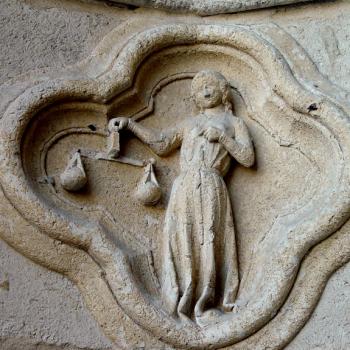
When disease strikes, we deal with it as is needed. It affects our lives. We stop doing the things we normally did so that we can rest and recover. We might wish things were otherwise, but so long as we are sick, we have to accept that we are ill and our lives will be different until we are better. What kind of ailment we have will determine what that means. If what we have is communicable, we do what we can to limit the chances others get sick from us. Often, this means we stay in our homes, away from others. It is a part of our responsibility to our neighbors.
Obviously, this is true, not only in regards our secular affairs, but our religious ones as well. When we are sick, we are not required, nor expected, to go to religious services. Indeed, if we are terribly sick, we are expected to stay home. How can we give someone a sign of peace if we willfully risk their own health for the chance to be by their side? Clearly, we cannot.
Sadly, when people are sick, they often went to go to church. They feel they should go, despite their illness. They ask, “How can we properly worship God if we do not go? How can we receive the graces of the sacraments if we do not go?” And yet, because it has long been established that they should not go, most recognize this and do not let their own wants and desires get the best of them. They stay home. They rest. They do what they can to get better as well as they keep others safe. And this is true with regards many ailments, even the common cold. By doing so, by showing respect to their neighbor and not needlessly putting them at risk, they are authentically worshiping God, showing their love for him by showing their love for their neighbor. We must not think they are neglectful of God, of their religious duty. For in reality, they are fulfilling it.
St Syncletica, one of the early Desert Mothers, understood this; she pointed out that when any of her fellow ascetics got sick and could not participate in liturgical celebrations, they should not be sorrowful but rather look at it as an opportunity for their own spiritual development:
She [Amma Syncletica] also said, ‘If illness weighs us down, let us not be sorrowful as though, because of illness and the prostration of our bodies we could not sing, for all these things are for our good, for the purification of our desires. Truly fasting and sleeping on the ground are set before us because of our sensuality. If illness then weakens this sensuality the reason for these practices is superfluous. For this is the great asceticism: to control oneself in illness and to sing hymns of thanksgiving to God.’[1]
While most of us are not ascetics, and so we might not be seeking ways to discipline our body in the same fashion as the Desert Fathers and Mothers, the underlying wisdom of Syncletica’s words apply to us. We must remember that we are to overcome all selfish forms of engagement with God. When we think of liturgy, and the sacraments, selfishly, as things we can rightfully demand whenever we want, we have already lost sight of God and the purpose of our worship. We are supposed to get over ourselves. But when we see communion as a way to reinforce the self and our desires, we no longer engage communion but rather cut ourselves off from it with that attitude. Communion is to bring us into a unity of love with others. When we promote self-love over such love for others, because this goes against the very nature of communion itself, communion is impossible.
When dealing with illness, when dealing with a pandemic, then, even if we do not go to liturgy as normal, even if we do not receive the eucharist as normal, we can and should be able to engage God spiritually and learn and grow in the situation we find ourselves in. We must abandon selfishness. We must take the opportunity given to us to learn further how we can and should die to the self. That way, we find ourselves open for true communion in God, whether or not we do so liturgically with the eucharist. We can and should give thanksgiving to God in all situations. If we cannot praise God in the silence of our hearts, away from liturgy, are we truly praising God in liturgy or are we looking at it as some sort of magical rite in which we try to put God under our control?
What is good, such as liturgical celebrations, often become so common place that the good which we can and should receive from it is diminished because we no longer appreciate the good itself. When we come face to face with the good which we had, but do not now have, we must ask ourselves why, and what good we can now receive. That is what Syncletica wanted her listeners to understand. Those who were sick were told to recognize the expectations which sickness placed upon them and to act accordingly. If they did not, they did not understand what their asceticism was about. It should never be a vehicle which reinforces selfish egotism. It should always serve as a basis by which the ascetic grows in love with God, and through such love for God, with their neighbor as well.
We are dealing with a major pandemic in the world today. We might not yet be sick, but there is a great sickness spreading across the world. Often, people do not know if they have the virus and are contagious. This is why public liturgical services have been suspended, so that people will not inadvertently infect others with a potentially lethal illness. How we deal with this fact tells us much about ourselves. Do we selfishly demand what we want and desire when it is not the right time, or do we accept the situation we are in and find the time to grow spiritually, to die to the self, and in so doing, gain the graces which we so desire?
[1] The Sayings of the Desert Fathers. Trans. Benedicta Ward (Kalamazoo, MI: Cistercian Publications, 1984), 232 [Syncletica 8].
Stay in touch! Like A Little Bit of Nothing on Facebook.
If you liked what you read, please consider sharing it with your friends and family!












